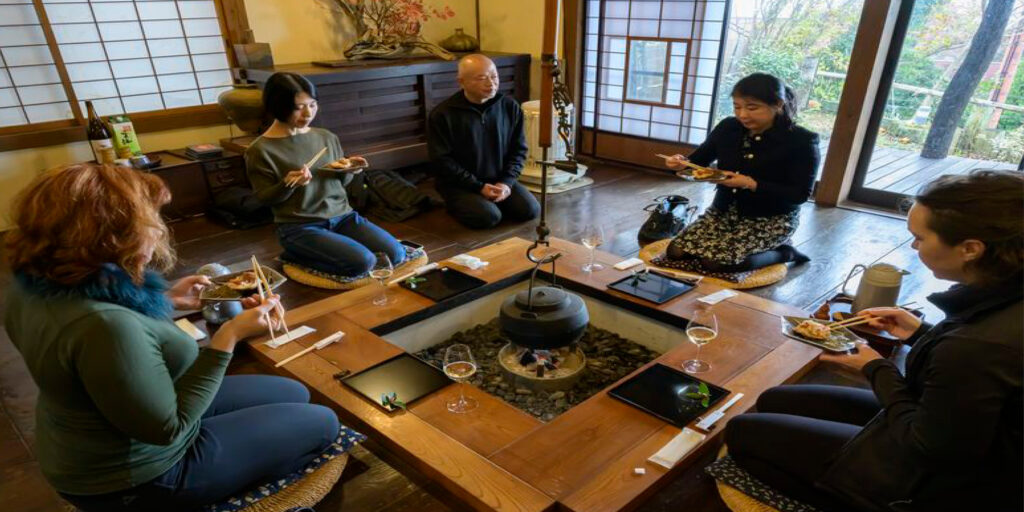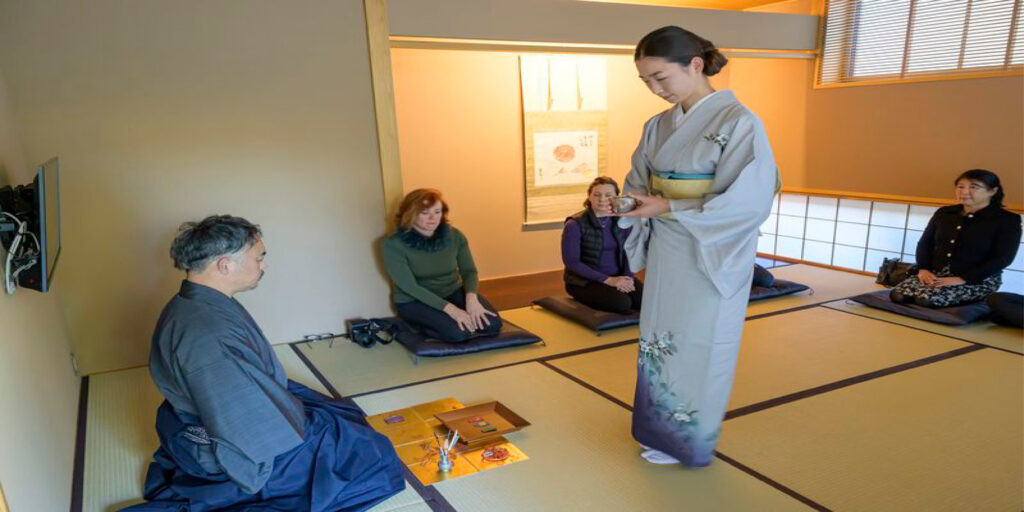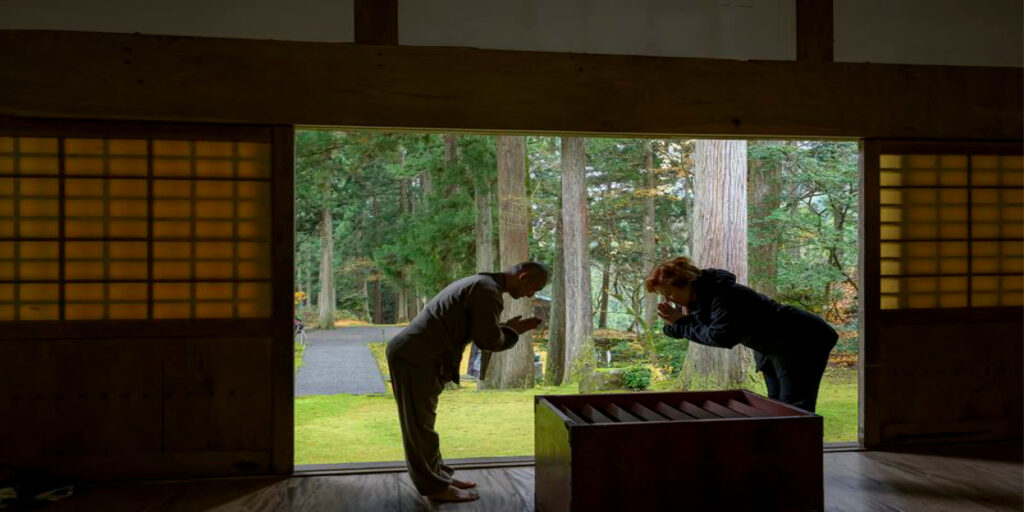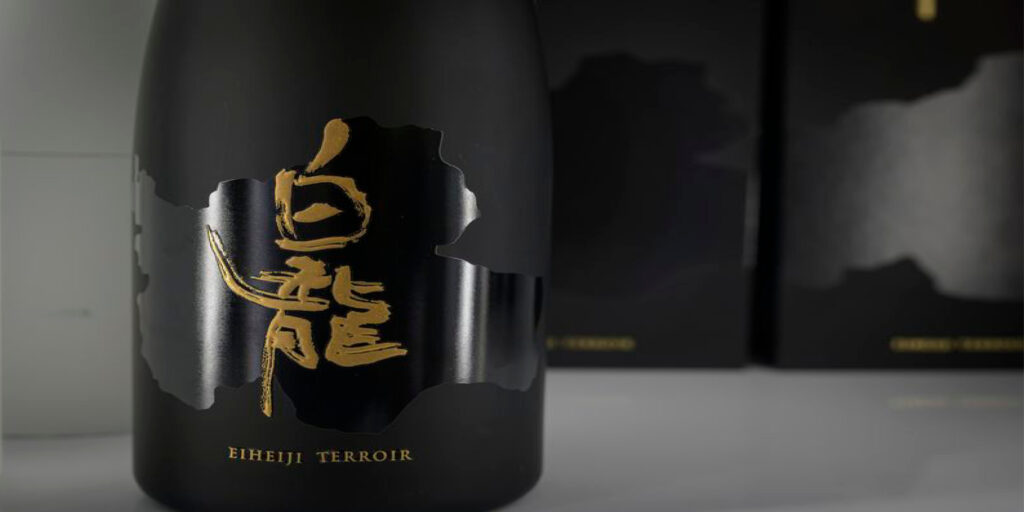japan wellness travel | Volume 1
Quiet Luxury & Spiritual Travel | Fukui, Japan
Written by Yoriko Soma, Conceptasia KK | February 2025
Photo Credit: Keisuke Kawazoe
Fukui Prefecture, facing the Sea of Japan, has so many extraordinary features. Beautiful sunsets, lots of fresh seafood, a fertile land producing rich vegetables, and a tranquil backdrop that perfectly complements the culinary artistry of Zen Eiheiji cuisine. Temple Shojin-Cuisine is something you have to experience in Fukui, Eiheiji. Zen Buddhism practices a cruelty-free diet with lots of natural, seasonable, local ingredients and food. Fukui’s wellness travel brings you unique experiences and one of the oldest Zen temples, Eiheiji.
Our writer traveled to these colorful destinations to bring you a firsthand account along with the historical significance and fascinating facts of these must-visit places.
Chapter 1: Zen | Eiheiji Temple

Daihonzan Eiheiji (大本山 永平寺) With a history spanning 750 years, Eiheiji is a Zen Buddhist temple dedicated to training monks. It offers tranquility, very clean air, and simple yet stunning art and architecture. Eiheiji Temple is a significant site for Zen Buddhism, and its surroundings will leave an unforgettable impression on your life. This temple was founded by Dogen Zenji (道元禅師), who studied Zen Buddhism in China during the Song Dynasty.
Eiheiji’s special experience begins with the guidance of the Laoshi (老師) teaching monk. The beautiful temple features numerous historical buildings adorned with Buddha statues, surrounded by exquisite Buddhist art and architecture. Experiencing Zazen in the special training hall is a wonderful way to release stress and cleanse both the body and soul. This time, we had the opportunity to engage in mindful “work practice” and clean the temple alongside the monks to gain an understanding of their daily routines. It created a lasting and memorable experience.
A night spent at the temple lodging, known as Hakujukan (柏樹関), is a unique adventure. Don’t be misled by the notion of a dark, simple accommodation; Hakujukan is a beautiful retreat that features a relaxing hot spa. Delight in authentic temple cuisine, or Shojin ryori (精進料理), during dinner. Hakujukan also offers the opportunity to join the morning chanting of sutras with all the monks in the grand hall. Together, we chant sutras and offer incense, creating a profound sense of community and tranquility.
Eiheiji Temple, built for the training of monks, is not geared toward tourists, which enhances its authenticity. It stands as one of the oldest Zen temples in Japan—and perhaps the world. Young Steve Jobs found mental clarity through the guidance of Eiheiji’s monks in California. Eiheiji is a sanctuary for leaders seeking mental wellbeing and a deeper understanding of Buddhism and Zen.
Recently, Fukui has been connected by the Bullet Train, making it easier than ever to visit this tranquil Zen village. The significance of Eiheiji Temple cannot be overstated.
Recommended place to stay: Hakujukan (Temple Lodging) / Inn Close to Zen (柏樹関)
Chapter 2: Wellness Lunch | Korokuan(小六庵) & Boyorou (望洋楼) - Mikuni Minato Area

Korokuan
With a stunning view of a beautiful Japanese garden and the Sea of Japan, Korokuan traces its origins to the end of the Edo period. It was founded by Hisa Miyagi, the daughter of a samurai, who moved from Kanazawa to Komatsu, adopting the name Koroku Miyagi and entertaining guests with joruri, a form of Japanese classical drama. The restaurant has upheld this tradition, honoring the natsume (棗) tree, which is said to have survived the Great Komatsu Fire of the early Showa period.
During our special trip to Fukui, we visited Boyorou, a renowned small luxury hotel with only seven rooms, famous for its exquisite crab and fish cuisine. They graciously delivered their Seiko crab meat appetizer and champagne to our lunch table at Korokuan. This was a fabulous treat! We settled by the irori (囲炉裏), enjoying the fresh crab meat appetizer and other appetizers before savoring Korokuan’s famous Japanese soba noodles.
Boyorou
With only seven rooms, this is the most luxurious hotel in Fukui. Guests can indulge in fresh, seasonal cuisine, particularly the exquisite Echizen crab—one of the most prized crabs in Japan—making for an unforgettable dining experience. Each room offers a stunning view of the Sea of Japan, allowing you to enjoy breathtaking sunsets. You can also unwind in a special onsen bath within the privacy of your own room.
Recommend place to stay: Boyorou & Auberge Homachi
Chapter 3: Kodo 香道 at Beniya Awara Onsen

Kodo is the Japanese art of appreciating the fragrances of various aromatic woods, such as Chinko, which is primarily sourced from Southeast Asia. Rooted in the spirit of Zen Buddhism, Kodo demands a deep commitment to etiquette, behavior, classical literature, and calligraphy as one progresses in the practice. However, at its core, Kodo is fundamentally about the enjoyment of fragrance itself. Many individuals appreciate incense without adhering to traditional Kodo etiquette, and numerous incense products are marketed for this purpose.
In Japan, one notable fragrant wood from Southeast Asia has arrived on Awaji Island. In a sense, fragrant wood embodies a form of “healing power,” created by trees in their natural effort to heal wounds. This phenomenon is beyond human control, as it arises from a unique combination of conditions. In Kodo, the act of appreciating incense is referred to as “hearing,” while “smelling” is often considered less refined. The two primary elements of Kodo are monko, the practice of listening to and appreciating the fragrances of aromatic woods, and kumiko, a game focused on distinguishing different scents. Practitioners believe that fragrant wood is a living entity, with each piece possessing a soul, and they treat this rare natural resource with the utmost respect and care. The term “listening” is used to describe the experience of attuning oneself to the voice of nature and the earth through the fragrance of these woods, fostering a connection with nature while also reflecting inward. Kodo has gained acceptance within wellness circles, as the scent of fragrant wood is known to positively influence brain function and revitalization.
Master Sohitsu Hachiya, Shinoryu – 志野流香道若宗匠 蜂谷宗苾
We invited Kodo master, Sohitsu Hachiya, to Beniya in order to lead the Kodo ceremony, a gathering to hear the fragrances, especially the incense 聞香会.
Sohitsu meticulously arranges the incense implements one by one, retrieving an incense packet from the Shino bag. He cleanses the tray with a fukusa, adorned with a design of Shinobugusa, a plant associated with the Shino school, rendered in exquisite maki-e lacquer. A small plate of mica, referred to as a “silver leaf,” is placed atop the ashes in the censer. Finally, the incense packet is carefully opened, and the fragrant wood is delicately grasped with wooden incense chopsticks before being placed on the silver leaf. As the aroma of the fragrant wood begins to waft through the air, the young master samples it and quietly announces the name of the fragrance: “Ouchi,” before passing it around to the other members of the group. Every movement he makes is a work of art. We savor the scent of this natural wood, a chip of fragrant wood that dates back several hundred years, as precious as a jewel. In that moment, we feel as though we have slipped back in time to the 15th century, experiencing the Japanese Renaissance during the Higashiyama Culture period.
Chapter 4: Experience at Zen Temple | 吉峰寺Kiboji (Kippoji) temple

This is the first Zen priest to enter Echizen, boasting a history of approximately 800 years. In 1243, at the request of Lord Hatano, Zen Master Dogen arrived at Kibo-ji Temple in Echizen, where he spent about a year before moving on to Eiheiji Temple. We walked up the mountain to reach Kibo-ji, which welcomed us warmly, fostering collaboration between monks and local farmers. Our first task was to prepare pickled daikon radish, an essential preserved food for the temple’s monks. The temple cuisine, known as Shojin Ryori (精進料理), embodies vegan cooking. We enjoyed a delightful Shojin meal at Kibo-ji Temple, appreciating the care and thoughtfulness behind every ingredient. Here at Eiheiji and Kibo-ji, meals hold great significance, particularly in terms of seasonal and local produce. We also created Zen cushions using scraps of cloth that were no longer in use, embodying the principle of minimizing waste. Every activity was filled with joy as we worked alongside the temple monks and Master, with local farmers joining us in this communal effort. The spirit of the wellness community was palpable, and those who participated felt a renewed sense of purpose in their lives.
Chapter 5: Visiting Japanese Sake Brewery

Fukui, which means “Fortune Fountain” in Japanese, is a region blessed with healthy food, a bountiful ocean, rich soil for rice cultivation, and pure water—elements that enrich its culture and craftsmanship. The pristine water and high-quality rice are the essence of its renowned sake breweries. The city of Eiheiji in particular, is home to two internationally acclaimed sake breweries, Hakuryu (白龍White Dragon) and Kokuryu (黒龍 Black Dragon).
Hakuryu(白龍 – White Dragon
Yoshida Shuzo (吉田酒造), Established 1806, Hakuryu (白龍) Brand Brewery. The CEO, master, executive directors, and even the chief brewer are all women, reflecting a commitment to sustainability and the preservation of this land for the next century. The rice brand Yamada Nishiki is a well-known variety. The sixth-generation owner, Tomo Yoshida, has dedicated himself to cultivating Yamada Nishiki rice in Eiheiji, as the Yoshida Brewery family has long supported local farmers and rice production. The harmonious blend of local rice, pristine water, and the rich history and expertise of the chief brewer come together to create Hakuryu.
Kokuryu (黒龍 – Black Dragon)
Kokuryu Ishidaya (黒龍 石田屋), Established 1804, The Kokuryu brand is one of the most prestigious sake brands in the world. One of its exclusive offerings, Muni (無二), can only be purchased by site holders through auction. The value of Muni and its superior brands is highly sought after by buyers from around the globe.
Mizuno, the current president of Kokuryu Ishidaya, has chosen to establish Eshikoto in Eiheiji Town, beside the river known as Nine Head Dragon (九頭竜). The name Eshikoto signifies “forever” and embodies the idea of doing good, aligning with the principles of the Sustainable Development Goals (SDGs).
Only individuals over 20 years of age can enjoy the facilities at Eshikoto, which include a sake tasting room, a shop, Acoya restaurant, a bakery, a soba noodle bar, and a sake factory with a brewery bunker. Eshikoto has been continuously evolving, with new and unique facilities being added to this expansive site. The owner, Kokuryu Sake Brewery, has created a complex dedicated to celebrating Fukui, with a focus on sake and food, which opened just a few years ago.
The vision for Eshikoto began with Naoto Mizuno, the eighth president of the company, who likened it to a Bordeaux or Napa Valley vineyard. Mizuno envisions a future where visitors from around the world come to enjoy sake and cuisine. Eshikoto is not just for sake enthusiasts; it offers a lifestyle experience and adventure for all. Mizuno noted that it took more than 10 years of meticulous planning, from site selection to construction materials, displays, and products. Recently, they also opened an auberge within this site.
© 2025 Wellness Travel University, LLC. All Rights Reserved.




